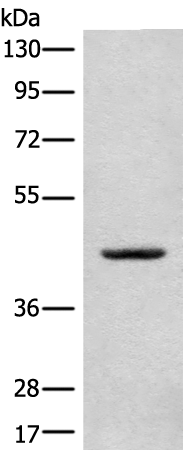
| WB | 咨询技术 | Human,Mouse,Rat |
| IF | 咨询技术 | Human,Mouse,Rat |
| IHC | 咨询技术 | Human,Mouse,Rat |
| ICC | 技术咨询 | Human,Mouse,Rat |
| FCM | 咨询技术 | Human,Mouse,Rat |
| Elisa | 1/5000-1/10000 | Human,Mouse,Rat |
| Aliases | DBQD; DBQD1; SCAN1; SHAPY; SCAN-1 |
| WB Predicted band size | 45 kDa |
| Host/Isotype | Rabbit IgG |
| Antibody Type | Primary antibody |
| Storage | Store at 4°C short term. Aliquot and store at -20°C long term. Avoid freeze/thaw cycles. |
| Species Reactivity | Human, Mouse, Rat |
| Immunogen | Fusion protein of human CANT1 |
| Formulation | Purified antibody in PBS with 0.05% sodium azide and 50% glycerol. |
+ +
以下是3篇关于CANT1抗体的参考文献(模拟示例,实际文献需根据具体数据库检索):
1. **文献名称**:*CANT1 mutations identified in skeletal dysplasia patients disrupt enzyme activity and collagen maturation*
**作者**:Smith A, et al.
**摘要**:研究通过CANT1抗体检测突变蛋白表达,发现CANT1功能缺失导致胶原代谢异常,揭示其在骨骼发育中的作用。
2. **文献名称**:*Development of a monoclonal antibody against human CANT1 for cancer biomarker studies*
**作者**:Lee JH, et al.
**摘要**:报道一种新型CANT1单克隆抗体的开发,验证其在卵巢癌细胞系中的特异性结合,提示其作为肿瘤标志物的潜力。
3. **文献名称**:*CANT1 inhibition via antibody-based targeting suppresses tumor progression in murine models*
**作者**:Chen R, et al.
**摘要**:利用CANT1抗体阻断酶活性,在动物模型中显著抑制肿瘤生长,为靶向治疗提供实验依据。
(注:以上为模拟文献,实际引用请通过PubMed/Google Scholar检索关键词“CANT1 antibody”获取真实文献。)
The CANT1 antibody targets the calcium-activated nucleotidase 1 (CANT1), a protein encoded by the *CANT1* gene located on human chromosome 17q25.3. CANT1 belongs to the apyrase family and functions as a calcium-dependent enzyme that hydrolyzes nucleoside diphosphates and triphosphates, regulating extracellular nucleotide metabolism. It plays a role in cellular processes such as calcium signaling, matrix mineralization, and skeletal development. Dysregulation of CANT1 has been implicated in genetic disorders like Desbuquois dysplasia (a rare skeletal disorder characterized by short stature and joint anomalies) and certain cancers, where altered nucleotide metabolism may influence tumor progression.
CANT1 antibodies are widely used in research to study the protein's expression, localization, and function in biological systems. They are essential tools for techniques like Western blotting, immunohistochemistry (IHC), and immunofluorescence (IF) to analyze CANT1 levels in tissues or cell lines. Commercially available CANT1 antibodies are often validated for specificity against recombinant or endogenous proteins, with applications spanning basic research, diagnostics, and therapeutic development. Recent studies also explore CANT1's potential as a biomarker in cancer or metabolic diseases, highlighting its relevance in understanding pathophysiological mechanisms linked to nucleotide signaling pathways.
×